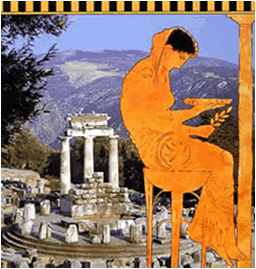 “… It was here that the Olympian gods spoke to mortal men through the use of a priesthood, which interpreted the trance-induced utterances of the Pythoness or Pythia. She was a middle-aged woman who sat on a copper-and-gold tripod, or, much earlier, on the “rock of the sibyl” (medium), and crouched over a fire while inhaling the smoke of burning laurel leaves, barley, marijuana, and oil, until a sufficient intoxication for her prophecies had been produced.”
“… It was here that the Olympian gods spoke to mortal men through the use of a priesthood, which interpreted the trance-induced utterances of the Pythoness or Pythia. She was a middle-aged woman who sat on a copper-and-gold tripod, or, much earlier, on the “rock of the sibyl” (medium), and crouched over a fire while inhaling the smoke of burning laurel leaves, barley, marijuana, and oil, until a sufficient intoxication for her prophecies had been produced.”
FROM ANCIENT EGYPT TO GREECE: TIS THINE OWN APOLLO REIGNS
According to the Greeks, the greatest outcome of the love affair between Zeus and Leto was the birth of the most beloved of the oracle gods—Apollo. More than any other god in ancient history, Apollo represented the passion for prophetic inquiry among the nations. Though mostly associated with classical Greece, scholars agree that Apollo existed before the Olympian pantheon and some even claim that this entity was first known as Apollo by the Hyperboreans—an ancient and legendary people to the north. Herodotus came to this conclusion and recorded how the Hyperboreans continued in worship of Apollo even after his induction into the Greek pantheon, making an annual pilgrimage to the land of Delos where they participtated in the famous Greek festivals of Apollo. Lycia—a small country in southwest Turkey—also had an early connection with Apollo, where he was known as Lykeios, which some have joined to the Greek Lykos or ‘wolf’, thus making one of his ancient titles, “the wolf slayer.”


























